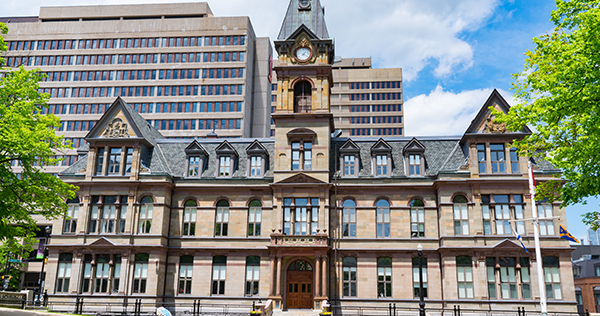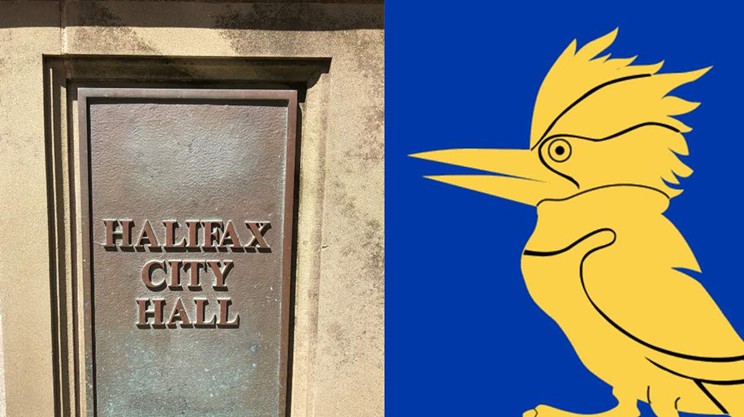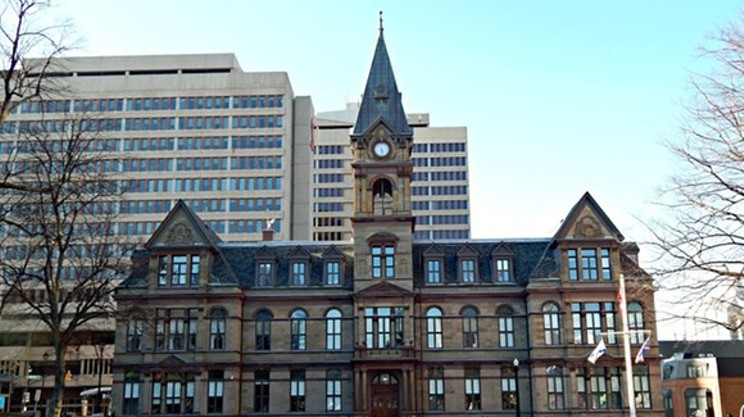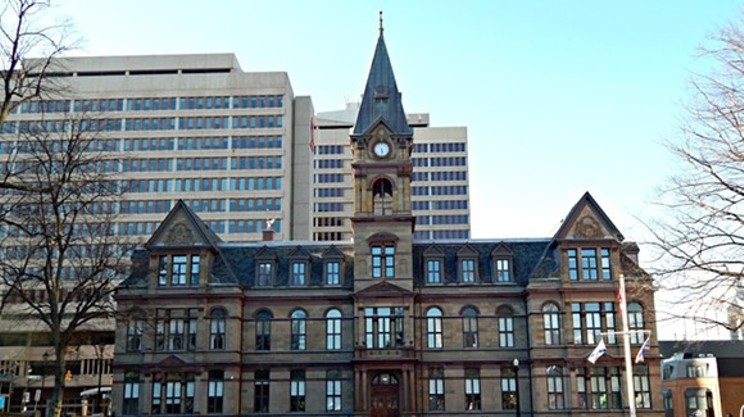It’s hard to explain to the layperson how significant the start of this year has been in municipal politics in the HRM. How significant Tuesday's council meeting may be in the history of policing in this city. In order to understand the significance of this meeting, we first need to understand the history of police forces and how that history echoes into today.
The fact that Indigenous people were overrepresented in prison in 2022 is directly related to the RCMP helping carry out the cultural genocide perpetrated against Indigenous peoples in the past.
The fact that cops oppressed labour movements in 1919 is related to cops evicting unhoused people from parks.
The thing that ties all this together is politics. Unfortunately, everything is always politics. Specifically politicians using police to enforce laws they wrote, or using police to enforce bad laws other people wrote. With violence, if necessary.
Residential schools were federal policy. The strike in 1919 was caused by exploitative labour policies. The decision to involve the cops that ended in the killing of two workers in 1919 was a municipal call. Evicting people from parks in 2021 in the HRM? Caused by enforcing a municipal bylaw.
Most of the people on this Halifax council seem to recognize both the harm perpetrated by the current model of policing and the role they play in perpetuating it. And to their credit, they seem to be genuinely trying to change their role in that process.
But since the city has limited ability to create or influence federal and provincial laws, it has to get creative. Halifax Regional Police chief Dan Kinsella routinely tells his oversight body that he doesn't want his cops policing poverty or responding to mental health calls, but they have to if they’re called. So the city is going to try and have mental health crisis teams respond to mental health calls instead of police. Essentially, the city wants to use its limited power to provide emergency response services that people actually need, and that can help better than a guy with a gun.
It's really hard to overstate how much of a radical shift in policy this will be. Instead of wasting police resources or punishing us for being poor, drunk or in distress, the city will try to help us instead.
This radical shift is evident elsewhere in the strategy, with plans to invest in programs and services that build community and prevent people from ever needing to interact with police. The shift was also evident elsewhere in the meeting. Councillors also passed a motion that will start to address the growing threat that is the lack of food security in Nova Scotia.
Council still needs to get this budget over the line, and these are long-term plans that need to survive multiple municipal elections.
But at the municipal level in Halifax, we the people have genuine legitimate access to power, and municipal policies are starting to reflect that.
We do not have the same access to provincial and federal power. Power rates and grocery bills reflect that.
Things that passed
Council did some time travel and amended a motion from Sept. 29, 2022. The municipal planning strategy around Dutch Village Road, in the Westerwald Street Study Area, is being reconsidered. Councillor Kathryn Morse wants the city to upzone this area, get some more density outside of the urban core. Her colleagues agreed and this passed.
Rural transit is going to keep getting the $370,000 it currently receives. Council defeated a motion it made in January, so that rural transit could be funded more reliably. This change also ensures rural transit is funded directly through taxes. Coucillor David Hendsbee had a strong showing in this part of the debate. Hendsbeee usually does when it comes to the inequities of moving around the rural parts of this city, it's one of his strongest files.
In a public hearing, council decided to sell 1940 Gottingen Street to the Mi’kmaw Native Friendship Society for $1.
Halifax Water presented its annual business plan to council. According to the report, Halifax Water is projecting a deficit of $7.1 million this year and is working on climate mitigation, expanding rural services and making sure the city’s water infrastructure can still deliver water. Friendly reminder that humans die in about three days without water. Councillor Sam Austin wants Halifax Water to give people flexibility to pay off their debts, even if their water has been cut off. Currently, if your water is cut off, your debt needs to be cleared in full to get reconnected. Which is bad news for anyone who needs water to live.
Council voted to give property tax relief to charities. This is predominantly an administrative change to make the taxation more uniform and predictable for the charities who receive this tax relief.
Since Otter Lake landfill will be in use for about 20 years longer than predicted, councillors Pam Lovelace and Patty Cuttell asked for a staff report about the landfill in April 2022. The report says the city may save some money by keeping the landfill open longer, and the councillors wanted to know if a community fund could be set up for the people who live close to the landfill (within a 5km radius) could see that money invested in their communities if the city does, in fact, save money.
The sign situation in rural HRM sucks really bad, but it used to be worse. The issue is complicated, but essentially the province owns a lot of the roads in rural HRM, but doesn’t do a lot of sign maintenance and does zero sign regulation. This means rural roads are littered with signs that sell stuff, and public signs with good information are in disrepair. Hendsbee wanted to fix that, so the city started a pilot project on the provincial highway 333, charging fees for commercial signs and maintaining public signs. Since it was successful, the city has decided to pass first reading of bylaws that will end the pilot project and make the practice of public repair and private registration of signs on provincial highways an HRM-wide policy.
The administrative fees associated with taxes are going up slightly. Need a new copy of your tax bill because you lost yours? $15. Pay the wrong account and need the city to move the money to your correct tax account? $15. Accidentally pay too much and want your money back? $15. (If you leave the money on your account for the next bill that would be free, though.) And the city will be bumping up the fee for a tax certificate from $75 to $100. The tax certificate fee will go up for the first time since it was set at $75 in 1997. This passed first reading, so it is not yet a sure thing—and it should be noted these fees will not be charged if the reason you need these services is the city's fault.
When the city paves a gravel road it owns, it charges the people who live on that road for part of that upgrade. Based on new legislation that passed first reading on Tuesday, homeowners on upgraded streets would be responsible for 33% of the cost of upgrading the gravel roads, should bylaw S-451 come to pass.
Council wants to be able to do hybrid meetings, with some councillors attending in-person and some online. Staff did a report and have some solutions, mainly new software, but needed council to decide the fate of hybrid democracy. Ultimately councillors decided that making council more accessible and public was best for democracy, and staff will come back with more details with that direction.
The city has a high-level food strategy, which is pretty neat. Basically, Nova Scotians are at great risk of starvation, national leaders in that risk, in fact. We have the worst food security of any Canadian province. This is something the provincial and federal governments should be doing more to fix, but since they are not, the city is doing a lot of work to make sure the residents of Halifax have food when climate change gets really bad, since our provincial politicians aren’t doing that. The city’s strategy is a very large plan that will take years to implement, which may not be fast enough. But at least one level of our government is doing something to look out for our long-term future. Hopefully, enough will be done on this to help the hungry residents of the HRM in a few years' time when the ongoing climate emergency will really “go like hell.”
Speaking of long-term plans for public safety. Halifax might become an honest-to-god world leader in it. The Halifax Public Safety strategy is a fundamental re-imagining of police, and council voted to start implementing it.
Halifax is on track to spend the federal rapid housing initiative money. The $11 million will produce roughly 45 affordable units, but must provide a minimum of 36.
The city’s buying two transfer trailers for $26,121 more than it planned due to inflation.
The city’s writing off a total of $114,087.46 in uncollected debts. Unlike banks, credit card companies or loan sharks, when you’re too poor to pay the city for your debts, the city doesn’t punish you for being poor. Could banks and credit card companies be regulated to protect you in the same way? They could! Your member of Parliament is the one you need to be angry at if your financial institutions are punishing you for being poor. You can find out who your MP is, and their contact information here. If your MP tells you that regulating companies in this way would be bad for the economy (as MPs often do), remind them that their responsibility is to you, a person they represent in the house of commons, not the companies who lobby them with legally-not-bribes like “business lunches” or “sponsored travel.” Also, if the economy genuinely demands our suffering to thrive, perhaps we should consider trying something else? Please?
Hey, Andy Fillmore, Darren Fisher and Darrel Samson? The people of Halifax could really use some banking regulations that protect us. For example, if people don't have money in their bank accounts, banks know that. And yet, even though banks know I have no money, I have to pay an administrative fee because they tried to send money they know I don't have? That's bullshit. If you are a member of Parliament reading this because you or your staffers know how to set up Google Alerts, please feel free to explore and exercise your regulatory powers.
The playing fields in the HRM will have painted lines, staff and a strategy for their management for the next one to 15 years. The short version is we have enough fields for everything in this city except cricket. So we may get some of those in the future. And the lighting could be better for some fields.
6112 Coburg Road will get a public hearing in the near future. It’s up for consideration as a heritage building.
If a building gets deemed to be a heritage building, renovations and repairs become more expensive for the owners of the new heritage homes. Because this is a decision made by the city for the public good, the city then also provides grants for these homeowners to help with keeping a really old building standing and in good repair. Since everything is getting more expensive, those grants will also go up slightly.
And councillor Lisa Blackburn asked for some staff reports to get updates on the Feely Lake land transfer (in the 1990s it was supposed to be made into a park and given to the city) and the Beaver Bank Bypass (also a plan from the 1990s that has been lost to time, but the MLA for the area wants to bring it back).






